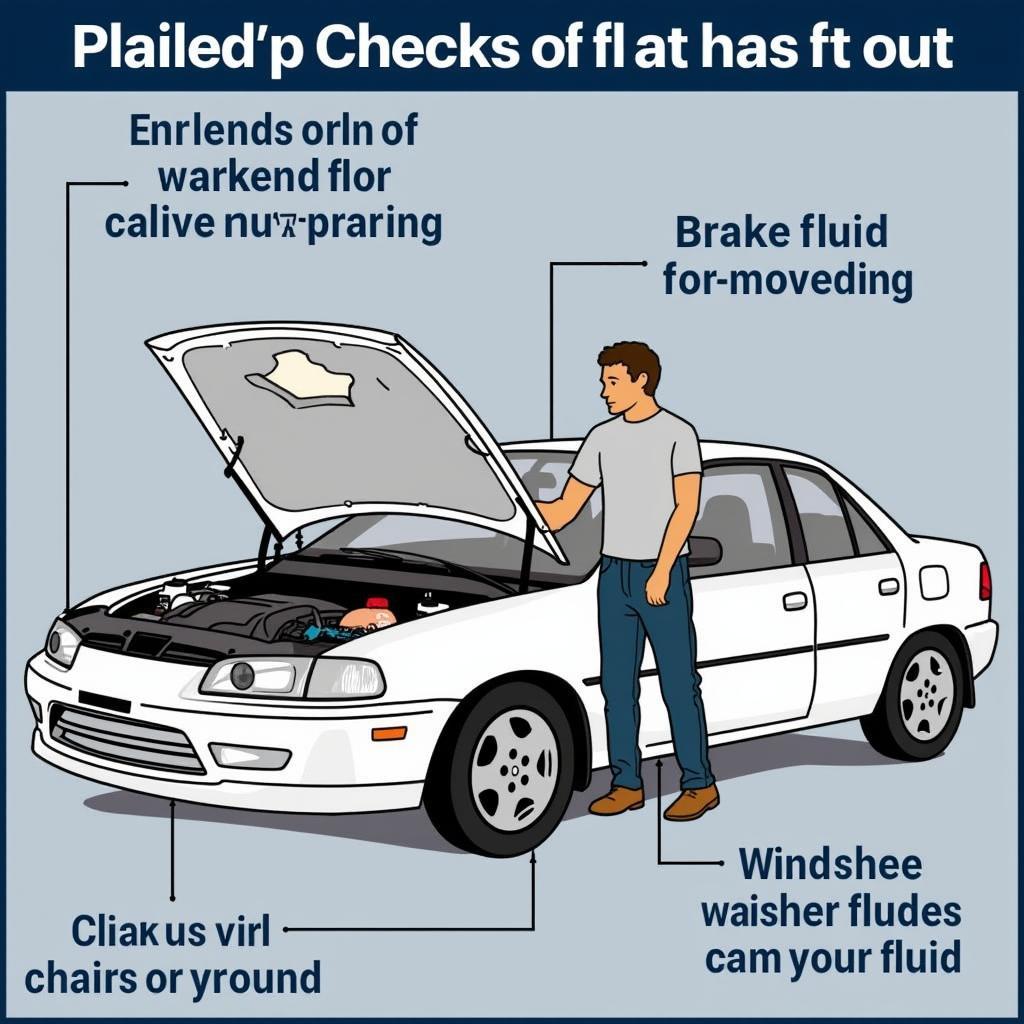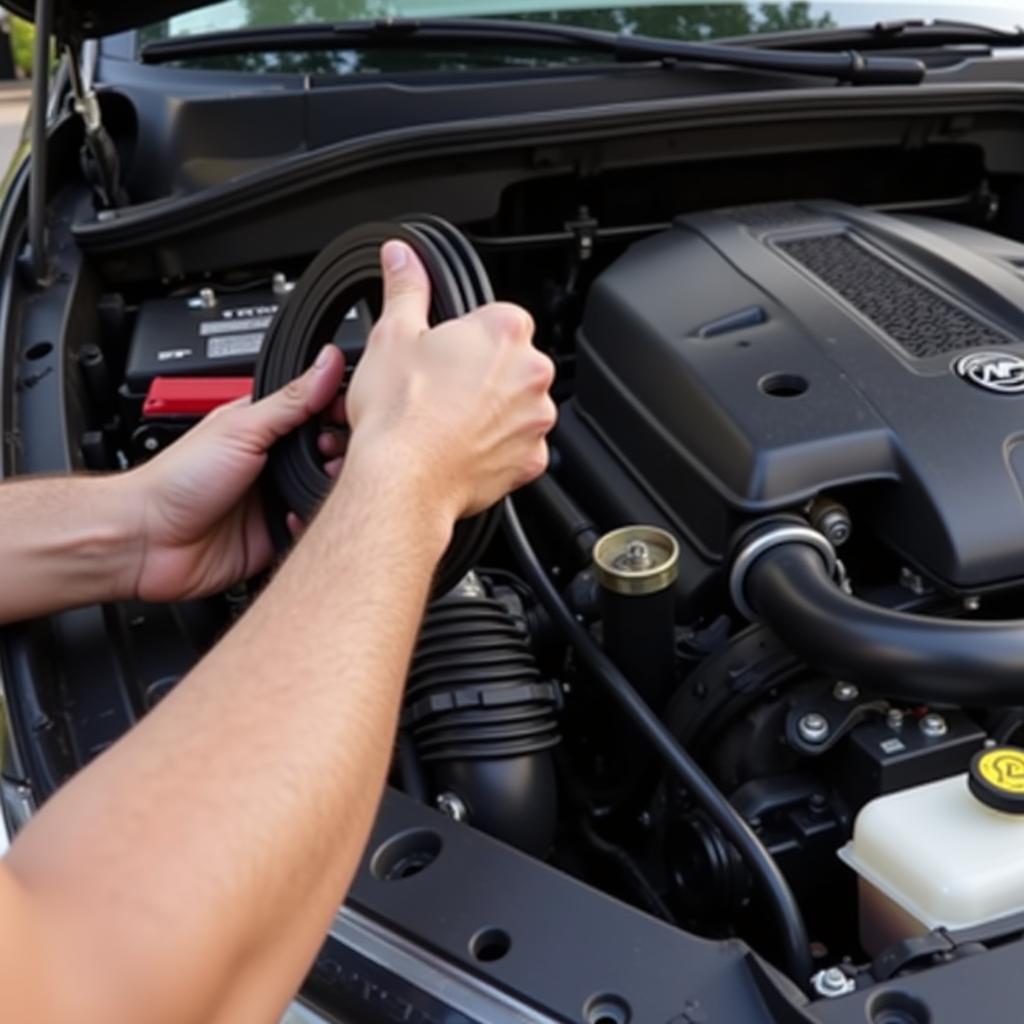Owning a car comes with responsibilities, and one of the most important is regular car maintenance. Neglecting basic upkeep can lead to costly repairs down the road and even jeopardize your safety. This guide provides a comprehensive overview of essential car maintenance tasks to keep your vehicle in top condition.
Why is Basic Car Maintenance Important?
Regular car maintenance is crucial for the following reasons:
- Safety: A well-maintained car is a safer car. Regular checks and services ensure that all components are in good working order, reducing the risk of breakdowns and accidents.
- Reliability: Consistent maintenance helps prevent unexpected breakdowns and ensures your car starts reliably every time.
- Longevity: Taking care of your car can significantly extend its lifespan, saving you money on replacement vehicles in the long run.
- Resale Value: A well-maintained car with a documented service history commands a higher resale value when it’s time to upgrade.
- Fuel Efficiency: A well-tuned engine, properly inflated tires, and clean air filters all contribute to optimal fuel efficiency, saving you money on gas.
Essential Car Maintenance Tasks
Here’s a breakdown of the fundamental car maintenance tasks you should be aware of:
1. Regular Fluid Checks and Changes
Your car relies on various fluids to function correctly. Regularly checking and changing these fluids is vital:
- Engine Oil: Engine oil lubricates moving parts, reduces friction, and helps cool the engine. Check the oil level monthly and replace it according to your owner’s manual’s recommendations.
- Coolant: Coolant regulates engine temperature and prevents overheating. Check the coolant level regularly and have the cooling system flushed and refilled as needed.
- Brake Fluid: Brake fluid transmits force from the brake pedal to the wheels, enabling braking. Have the brake fluid flushed and replaced every two years or as recommended by your mechanic.
- Transmission Fluid: Transmission fluid lubricates the transmission’s internal components, ensuring smooth gear changes. Consult your owner’s manual for the recommended transmission fluid change intervals.
- Power Steering Fluid: Power steering fluid assists in turning the steering wheel effortlessly. Check the fluid level periodically and top it up if necessary.
 Checking car fluids
Checking car fluids
2. Tire Maintenance
Tires are your car’s only point of contact with the road, making their maintenance paramount:
- Tire Pressure: Proper tire pressure ensures optimal performance, fuel efficiency, and safety. Check tire pressure monthly and inflate to the recommended PSI (pounds per square inch) listed in your owner’s manual or on the tire sidewall.
- Tire Rotation: Rotating your tires helps ensure even wear and tear, extending their lifespan. Consult your owner’s manual for recommended rotation intervals.
- Tread Depth: Sufficient tread depth is crucial for maintaining traction and preventing hydroplaning. Check tread depth regularly using a tread depth gauge or the penny test. If the tread is worn down to 2/32 of an inch, it’s time to replace your tires.
For a detailed guide on maintaining different car brands, you can check out our comprehensive car maintenance brand list.
3. Brake System Inspection
The braking system is arguably the most critical safety feature in your car. Regular inspections are non-negotiable:
- Brake Pads and Rotors: Brake pads and rotors wear down over time and need to be inspected regularly. If you notice any screeching noises or vibrations during braking, it’s crucial to have your brakes checked by a qualified mechanic.
- Brake Lines and Hoses: Inspect brake lines and hoses for cracks, leaks, or wear and tear. These components are vital for transmitting brake fluid pressure and should be replaced if compromised.
“Ignoring your car’s braking system is like playing Russian roulette with your safety,” says veteran mechanic John Miller. “Regular inspections can save you from potentially life-threatening situations.”
4. Battery Care
Your car battery provides the electrical current needed to start the engine and power various electrical components:
- Battery Terminals: Keep battery terminals clean and free of corrosion. Corrosion can hinder the flow of electricity and lead to starting problems.
- Battery Testing: Have your battery tested regularly to ensure it’s holding a proper charge. Batteries typically last around 3-5 years.
5. Air Filter Replacement
Your car’s engine needs a constant supply of clean air to function correctly:
- Engine Air Filter: A dirty engine air filter restricts airflow to the engine, reducing performance and fuel efficiency. Replace the engine air filter according to your owner’s manual’s recommendations.
- Cabin Air Filter: The cabin air filter cleans the air entering your car’s cabin, keeping dust, pollen, and other pollutants at bay. Replace the cabin air filter annually or as needed.
6. Lights and Electrical System
Properly functioning lights are essential for safety, especially during nighttime driving:
- Headlights, Taillights, and Turn Signals: Regularly inspect all lights to ensure they’re working correctly. Replace any burnt-out bulbs immediately.
- Windshield Wipers and Fluid: Windshield wipers and fluid are crucial for maintaining clear visibility during inclement weather. Replace wiper blades every 6-12 months or as needed.
If you’re looking for cars with lower maintenance costs, you can explore our list of the [best low maintenance used luxury cars in India](https://autotippro.com/best low-maintenance-used-luxury-cars-in-india/).
7. Belts and Hoses
Belts and hoses play a critical role in the smooth operation of various engine components:
- Serpentine Belt: The serpentine belt drives the alternator, power steering pump, water pump, and other accessories. Inspect the belt for cracks, fraying, or glazing.
- Timing Belt: The timing belt synchronizes the engine’s valves and pistons. A broken timing belt can lead to catastrophic engine damage. Consult your owner’s manual for recommended replacement intervals.
- Hoses: Inspect all hoses for leaks, cracks, or bulges. Replace any worn or damaged hoses immediately.
 Inspecting an engine belt
Inspecting an engine belt
Regular Maintenance Schedule
Refer to your owner’s manual for the manufacturer’s recommended maintenance schedule for your specific vehicle model. However, here’s a general guideline:
- Every 3,000 Miles or 3 Months:
- Change engine oil and filter
- Check tire pressure and tread depth
- Inspect all fluids and top off as needed
- Every 6,000 Miles or 6 Months:
- Rotate tires
- Inspect brakes
- Check battery and terminals
- Replace air filter
- Every 12,000 Miles or 12 Months:
- Flush and replace coolant
- Inspect and service serpentine belt
- Inspect and replace hoses as needed
- Lubricate chassis
- Every 30,000 Miles or 2 Years:
- Flush and replace brake fluid
- Inspect and service transmission
- As Needed:
- Replace windshield wipers
- Replace burnt-out light bulbs
“Sticking to a regular maintenance schedule is the single best thing you can do for your car,” advises automotive engineer Sarah Thompson. “It’s an investment that pays off in the long run, both in terms of cost savings and peace of mind.”
Conclusion
Regular car maintenance is essential for ensuring your vehicle’s safety, reliability, and longevity. By following the guidelines in this guide, you can proactively address potential issues before they escalate into major problems. Remember, a well-maintained car is a joy to drive and provides peace of mind on the road. If you have any questions or concerns, don’t hesitate to reach out to AutoTipPro at +1 (641) 206-8880 or visit our office at 500 N St Mary’s St, San Antonio, TX 78205, United States. We’re here to help you keep your car in top shape!




Leave a Reply